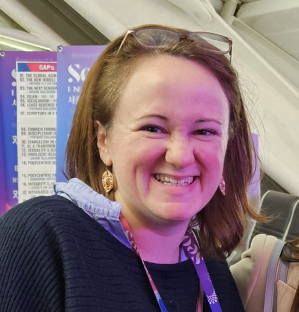Lucy Kazidri, the leader of the International Council on Evangelical Theological Education (ICETE) team that influences children and families, spoke to Christian Daily International about the urgent need to deepen integration of ministry into children’s theological education. She shared how the initiative started, what the gaps existed, and what the group wanted to achieve.
Kajidori is an educator with experience in intercultural ministries and development. She has an MTH at Oxford University, UK and is a doctoral candidate at Fuller Theological Seminary in California, USA, where she studies local and contextual theology of children. She is also a researcher in theology and practice of the Viva Network, a Christian NGO that works with children internationally.
CDI: Lucy, thank you for talking to us. Can you share how you started to engage with the Icete Impact team that focuses on children?
Kajidori: It really started with Dr. Michael Ortiz (ICETE Executive Director) and the ICETE Leadership Team. They are deeply convinced that theological education is not doing enough to focus on the next generation, and now it is our number one priority. So they created three groups. One is for the next generation, the other is for youth ministry, and the other is for children and families. I was invited to lead a group of children and family.
The key idea is that this is not just a token gesture. We go deeper and try to make sure that theological education is very useful to the churches that serve these groups.
CDI: What gaps do you think you need to address?

Kajidori: Well, half of the world’s population is under the age of 18. However, looking at theological training institutions, the majority do not provide ministry training to children and young people. And those who often treat it as a very independent specialist field are meant to make those trainings become children’s pastors and young workers.
But we argue that all pastors will work together with children, parents and grandparents in the church and community, regardless of their role. We want to move away from seeing children as “add-ons” and instead recognize them as core parts of the church.
CDI: You said earlier that many people come to faith at a young age. How will that affect your work?
Kajidori: Yes, from the 4-14 window movements led by Luis Bush and others, you can gain faith between the ages of 4 and 14 than other life stages. So, if we want to be serious about our mission and evangelism, we must be serious about ministry for children and young people.
This means that pastors themselves need to be equipped to serve the youth, or at least lead and support those who do so. It is a key moment in the development of faith.
CDI: What were the key points from this week’s group conversation?
Kajidori: Three major challenges stood out.
Firstly, there is a lack of collaboration. Seminars, churches, families and children’s ministries often work in silos. We want to be a bridge builder connecting dots between those groups.
Second, I realized a true lack of locally developed curriculum and resources, designed for theological education focused specifically on children and young people. So we created subgroups for the impact team to work on resources and curriculum development.
And thirdly, and perhaps the most difficult: theological education has cultural issues. Many institutions are not taking children seriously yet. There is this fundamental belief that the church exists primarily to serve adults. It will take decades to change that mindset, but I hope this impact group will become part of that shift.
CDI: What would your dream scenario look like if everything goes as you want?
Kajidori: Our big dream is that all students in theological institutions associated with all Icete must take core courses or modules in ministry with children, whether they are formal or informal programs. Not as an option addition, but as an important part of their training.
We hope that it will become a normal, anticipated part of theological education around the world.
CDI: Is there anything else you would like to share?
Kajidori: Yes, I also admitted that there is a gender factor to this. In many places, the mission of children is primarily carried out by women. There were three men on the Impact team and I was excited to see them there! However, we want to explore why more men are not engaged in advocacy for children in theological education. So if there are guys out there who are worried about this and want to join, come and join us!
